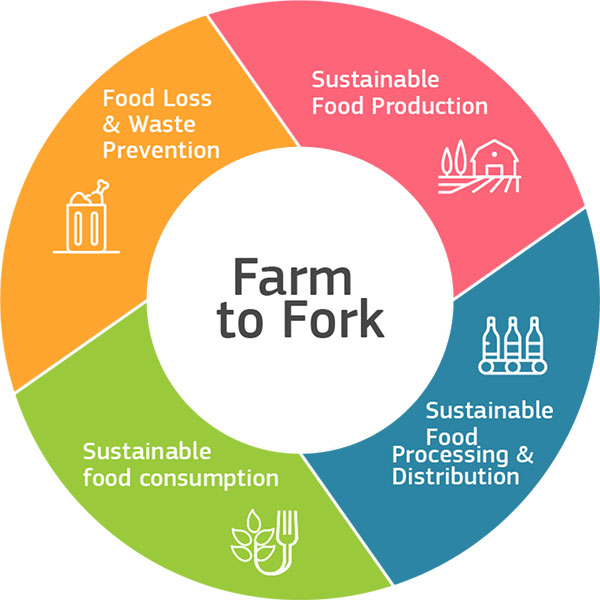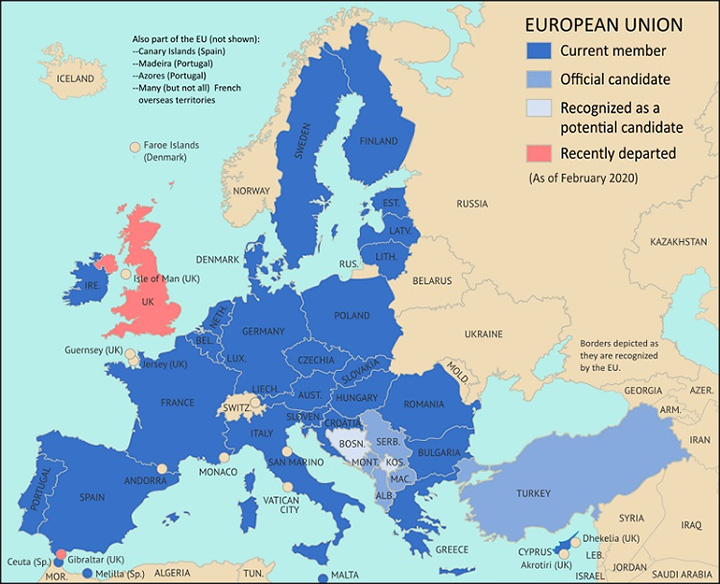International Relations
India-EU Meet on Agriculture
- 08 Jul 2021
- 6 min read
Why in News
Recently, a Virtual meeting between India’s Union Minister for Agriculture & Farmers Welfare and a Member of the European Commission (EC), Agriculture was held.
- The strong momentum of the India-European Union (EU) relations especially since the last India-EU Summit in July, 2020 was acknowledged.
- Earlier, Indian Prime Minister participated in the India-European Union (EU) Leaders’ Meeting.
Key Points
- Major Discussions:
- EU Common Agricultural Policy (CAP):
- Launched in 1962, it is a partnership between agriculture and society, and between Europe and its farmers.
- It is a common policy for all EU countries. It is managed and funded at European level from the resources of the EU’s budget.
- It aims to support farmers, improve agricultural productivity, ensure a stable supply of affordable food, safeguard EU farmers, tackle climate change and the sustainable management of natural resources etc.
- EU Farm to Fork Strategy:
- It is at the heart of the European Green Deal aiming to make food systems fair, healthy and environmentally-friendly. It aims to accelerate transition to a sustainable food system.

- Reforms were undertaken by the EU in the CAP as well as the Farm to Fork Strategy to make agriculture green as well as sustainable.
- The EU has also set a target of bringing 25% of the area in the EU under Organic Farming by 2030.
- It is at the heart of the European Green Deal aiming to make food systems fair, healthy and environmentally-friendly. It aims to accelerate transition to a sustainable food system.
- G20 Agriculture Ministers’ Meeting 2021:
- It is one of the ministerial meetings organized as part of the G20 Leaders Summit 2021, which will be hosted by Italy in October 2021.
- It will focus on three broad, interconnected pillars of action: People, Planet, Prosperity.
- Both India-EU are looking forward to bilateral cooperation at the summit.
- United Nations Food System Summit 2021.
- The United Nations (UN) Secretary General has called for the first ever UN Food Systems Summit to be held in September 2021 to strategize the actions for positive change in Agri-food systems in the world to realize the vision of the 2030 Agenda for Sustainable Development.
- The EU and India are looking forward to strengthening their cooperation at the summit.
- EU Common Agricultural Policy (CAP):
- India’s Stand:
- Dominance of Small Farmers:
- 70% of its rural households still depend primarily on agriculture for their livelihood, with 82% of farmers being small and marginal.
- Highlighted the recent initiatives to Increase Farmers Income:
- Agriculture Infrastructure Fund with a corpus of Rs One Lakh Crore for development of farm gate and agriculture marketing infrastructure in rural areas.
- Scheme of formation of 10000 Farmer Produce Organizations (FPOs) to help small and marginal farmers in marketing of agricultural produce.
- Explained Steps to Make Agriculture Sustainable and Environment Friendly:
- Encouragement of application of Nano-urea.
- Organic Farming under the Pramparagat Krishi Vikas Yojana.
- Maximum Residual Limit (MRL) of Tricyclazole:
- Raised the issue of fixing the Maximum Residual Limit (MRL) of Tricyclazole used in rice crop which has been a concern for India and is affecting India’s Basmati Rice Exports to the EU.
- The MRL is the maximum concentration for a pesticide on a crop or food commodity resulting from the use of pesticide according to Good Agricultural Practices (GAP), which is expressed in ppm.
- Tricyclazole is a fungicide used for the control of rice blast but it is not approved for use in the EU.
- Raised the issue of fixing the Maximum Residual Limit (MRL) of Tricyclazole used in rice crop which has been a concern for India and is affecting India’s Basmati Rice Exports to the EU.
- Dominance of Small Farmers:
European Commission (EC)
- About:
- It is an executive body of the EU, responsible for proposing legislation, implementing decisions, upholding the EU treaties and managing the day-to-day business of the EU.
- The EU is a group of 27 countries that operate as a cohesive economic and political block.
- The Commission is divided into departments known as Directorates-General (DGs) that can be likened to departments or ministries headed by a director-general who is responsible to a commissioner.
- It is an executive body of the EU, responsible for proposing legislation, implementing decisions, upholding the EU treaties and managing the day-to-day business of the EU.
- Structure:
- It operates as a cabinet government, with 28 members of the Commission. There is one member per member state. These members are proposed by member countries and European Parliament gives final approval to them.
- One of the 28 members is the Commission President proposed by the European Council and elected by the European Parliament.
Way Forward
- India can pursue EU countries to engage in Indo-pacific narrative, geo-economically if not from a security prism.
- It can mobilise massive economic resources for sustainable development of regional infrastructure, wield political influence and leverage its significant soft power to shape the Indo-Pacific discourse.
- India and the European Union have been negotiating a free trade deal, but it is pending since 2007.
- Therefore, for closer convergence between India and the EU, both should engage in finalisation of the trade deal as soon as possible.





